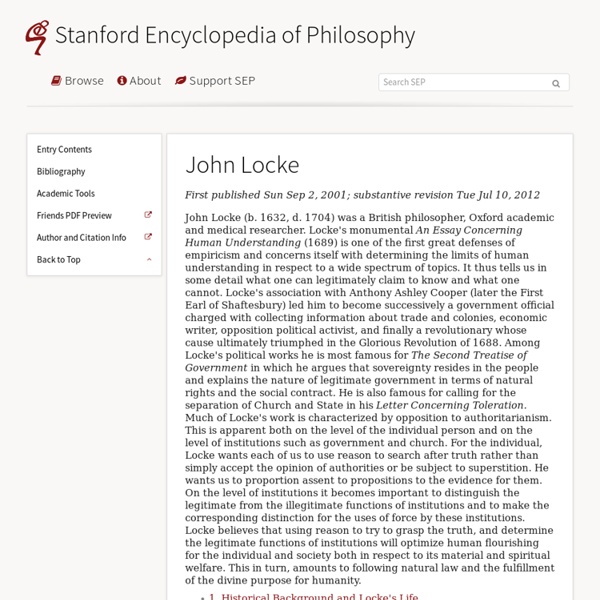John Locke
Signature Ses écrits sur la tolérance ne peuvent être disjoints d'une période où s'opère un profond réajustement des champs politiques et religieux. Dans l'optique qui s'ouvre en partie grâce à lui, le politique s'occupe du monde présent et la religion s'occupe du monde de l'au-delà, les deux ne devant pas interférer. Sa théorie politique s'oppose à l'absolutisme qui se met alors en place en France et qui échoue à s'imposer en Angleterre, en partie à cause de lui. Son Essai sur l'entendement humain est un ouvrage majeur dans lequel il construit une théorie des idées et une philosophie de l'esprit. Biographie[modifier | modifier le code] Origines familiales et formation[modifier | modifier le code] Pendant la guerre civile (1641-1649), John Locke (père) sert avec le grade de capitaine dans la cavalerie de l'armée du Parlement. Durant ses études, il se contente du nécessaire pour obtenir ses diplômes[Lesquels ?] Professeur à l'université d'Oxford (1660-1667)[modifier | modifier le code]
Kant and Locke - Ishmailites
Some automatic feature of my software reformated my cut and pasted text creating an even more unreadable copy than normal so I will attempt to resend it Dear Ffrangcon, John and Nick, "For unless you own the whale, you are but a provincial and sentimentalist in Truth, "(MD 76) Thanks to all for the inspiration to look again at one of Melville's striking images contrasting things on multiple levels. In reference to the depth of Melville's understanding of Locke and Kant consider if you will his use of their respective philosophies in the makeup of Ahab. Diving a little deeper, Locke's "An Essay Concerning Human Understanding> pioneered the modern view of self-identity in which individual self-identity evolves through consciousness and not through a priori innate ideas that Christian Scholastics believed was axiomatic to mankind . the senses. "God help thee, old man, thy thoughts have created a creature in thee; and he whose intense thinking thus makes him a that feeds on his heart? > Senses.
Power Moby-Dick, the Online Annotation — Chapter 73
It must be borne in mind that all this time we have a Sperm Whale's prodigious head hanging to the Pequod's side. But we must let it continue hanging there a while till we can get a chance to attend to it. For the present other matters press, and the best we can do now for the head, is to pray heaven the tackles may hold. Now, during the past night and forenoon, the Pequod had gradually drifted into a sea, which, by its occasional patches of page 322 yellow brit, gave unusual tokens of the vicinity of Right Whales, a species of the Leviathan that but few supposed to be at this particular time lurking anywhere near. Three rods: 18 feet Contending: opposing Nor was this long wanting. page 323 to fly. The eager Israelites: in Exodus 17:6, God tells Moses to hit a rock with his staff, and water flows from it for the parched Israelites to drink Smitten: struck At last his spout grew thick, and with a frightful roll and vomit, he turned upon his back a corpse. "Wants with it?" "Why not?" "Sink him!
Power Moby-Dick, the Online Annotation — Chapter 74
page 327 Laying their heads together: Here is a comparison diagram from Maury's Sailing Directions, published in November, 1851 Folio: that is, the largest size, as categorized in Chapter XXXII Here, now, are two great whales, laying their heads together; let us join them, and lay together our own. Of the grand order of folio Leviathans, the Sperm Whale and the Right Whale are by far the most noteworthy. In the first place, you are struck by the general contrast between these heads. Let us now note what is least dissimilar in these heads—namely, the two most important organs, the eye and the ear. page 328 Far back on the side of the head, and low down, near the angle of either whale's jaw, if you narrowly search, you will at last see a lashless eye, which you would fancy to be a young colt's eye; so out of all proportion is it to the magnitude of the head. A curious and most puzzling question might be started concerning page 329 this visual matter as touching the Leviathan. page 330 right.



